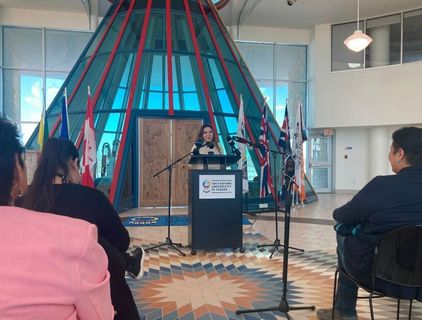INCA launches 4-year degree program

$915,000 in additional funding for “long overdue” program expected over five years
On March 7, Indigenous Communication Arts (INCA), a program at the First Nations University (FNUniv) of Canada, launched the first four-year Indigenous Journalism and Communication Arts degree in North America.
Dr. Jacqueline Ottmann, FNUniv’s president and an Anishinaabe academic from Fishing Lake First Nation in Saskatchewan, stated that “beginning this September FNUniv will accept students into a four-year degree in Indigenous journalism and communication and a two-year after degree program. This will add to our existing one-year certificate and two-year diploma programs, and give students the opportunity to complete a full bachelor of arts degree in Indigenous journalism and communication.”
For nearly 40 years, INCA has provided a two-year diploma program. More recently, a one-year certificate program concentrating on community radio and community relations was introduced.
According to Ottmann, “The degree is unique and long overdue. […] we need Indigenous voices and perspectives to tell our stories accurately and respectfully.”
According to a study conducted by INCA, 80 per cent of media managers plan to increase Indigenous-based hiring in the coming five years. Offering a degree that equips students with the skills and knowledge imperative for such job opportunities will be tremendously helpful for those who wish to pursue a career in INCA related fields.
“The demand for Indigenous journalists and communication professionals has never been greater,” said Shannon Avison, an associate professor of INCA at FNUniv. “We get calls every day from organizations seeking interns and graduates.”
Furthermore, Ottmann announced additional funding to support the program, including $121,000 annually from the Mastercard Foundation for five years, $100,000 annually from the Inspirit Foundation over three years, and an expected $10,000 in internship support from J-Schools Canada/Écoles-J Canada and the Google News Initiative during the program’s first year.
Ottmann also emphasized the importance of journalism done by Indigenous people in Indigenous languages. “It’s different when it’s translated into English and we all know that there is a lot that is lost in translation. […] there are so many contributions that Indigenous peoples have made to the society. […] there are people that are pushing boundaries in society and that is what we would like to inspire here, that we encourage our students and our faculties and our staff to push boundaries in good ways.”
She continued: “No matter the platform, it is vital that our stories are told from our own perspectives, our own languages, and through our own voices.”
Avison believes that the time is right to expand our offerings with a full four-year bachelor of arts. “The Truth and Reconciliation Commission calls on us to ensure that Indigenous and non-Indigenous journalists have a strong foundation in Indigenous issues in Canada. FNUniv is the right post-secondary institution to do that,” she said.
Student accounts suggest that they are happy with the introduction of the program. “All students can benefit from Indigenous-focused learning,” said Hannah Scott, a third-year Faculty of Arts student at the University of Regina. “Reconciliation is a team effort. At INCA, everyone is really kind and excited to work with one another no matter their background.”
Registration for the program is now open and further information can also be found at incaonline.ca









